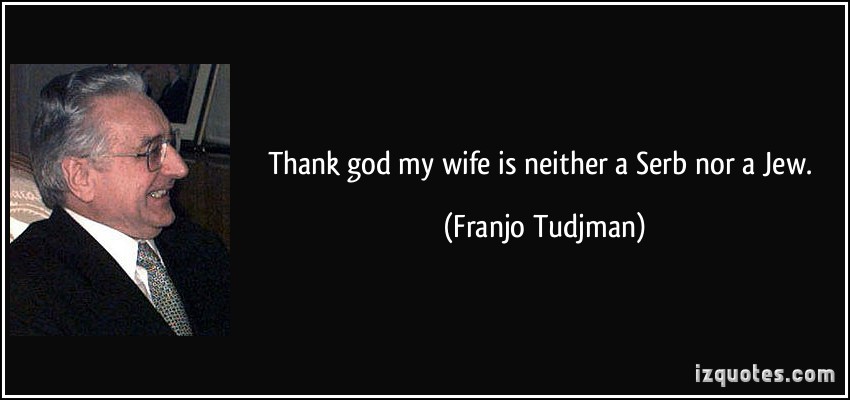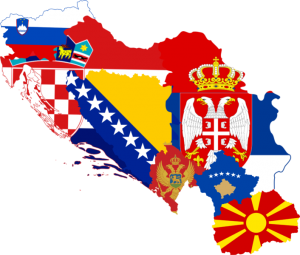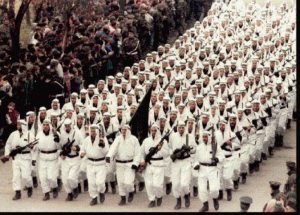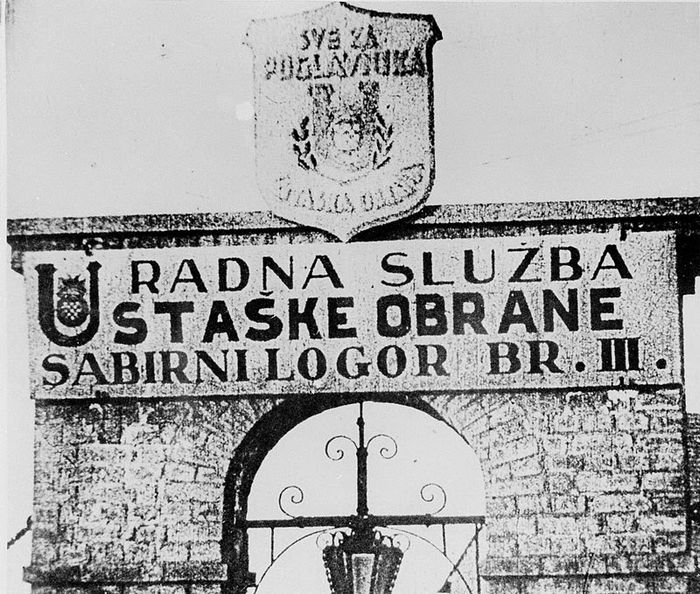
The entrance-gate to the death camp of Jasenovac in Croatia
Views: 1756
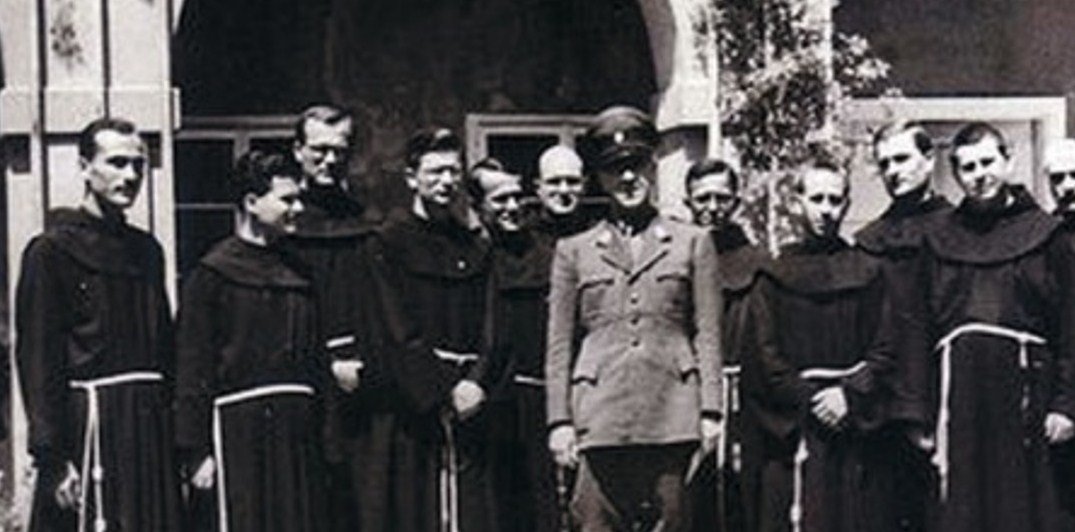
While this excellent analysis by Srdja Trifkovic focuses on the “internal” history of Croatia, it is important to note that four days after Nazi Germany declared war on the United States, Hitler’s staunch ally the Independent State of Croatia (NDH) declared war on both the United Kingdom and on the United States on December 14, 1941. What makes this especially significant is that less than three years later, on April 16, 1944, which was Easter Sunday for the Serbian Orthodox, the Anglo-American forces bombed Belgrade, the capital of their loyal and devoted ally Serbia, even though there was no strategic reason to do so. The consequences of the bombing campaign were devasting for the Serbs, who lost tens of thousands of innocent civilians on that Holy day. No such Anglo-American bombing campaign was ever initiated against Zagreb, the capital of the Independent State of Croatia.
Aleksandra Rebic
 Division of the Kingdom of Yugoslavia in April 1941
Division of the Kingdom of Yugoslavia in April 1941
Some important Westerners may prefer to look forward, to forget, minimize, or even deny, the fruits of the Croatian Holocaust of 1941-45 and its revived legacy of 1995. The endeavor is flawed. Sins unatoned for will continue coming back to haunt us.
The range of moral and political issues raised by the Ustaša movement and the regime it established in Croatia on April 10, 1941, is comparable to the Third Reich. In both cases, a political group, organized into a regime, devoted extraordinary resources to mass murder based on the victims’ race, creed or ethnicity. In both cases most ordinary Germans and ordinary Croats – those not directly affiliated with the regime, or overtly supportive of its goals and methods – opted for passive acquiescence. In both cases only a small minority was directly involved in the killing. In both cases the perpetrators understood why it had to be done; the mass murder made sense to them.
There are intriguing differences. The Nazis subjected ordinary Germans to relentless anti-Semitic indoctrination for almost a decade prior to the final, exterminationist phase of 1942-45. The anti-Serb propaganda campaign conducted by the Ustaša regime preceded the beginning of its own exterminationist campaign by weeks rather than months. In both cases modern racial myths were blended with a mix of pre-existing myths, stereotypes and prejudices, thus preparing ordinary people to internalize the dehumanization and subsequent liquidation of the victims. In Croatia, however, the collective indoctrination preceding the mass murder could be so much shorter because the soil was more receptive to the seed.
The Ustaša movement had its roots in the political tradition based on Croatia’s state rights, which included the key claim that no inhabitants of Croatia were exempt from the jurisdiction of its political and legal institutions. For the upholders of this view, the Serbs of the Military Border were unwelcome aliens for as long as they insisted on retaining their distinct name, their autonomous legal status vis-à-vis Civil Croatia, and their Orthodox faith. An obsessive aristocratic resentment at Grenzer priviliges was passed on from one generation to another, and became democratized after the collapse of feudalism in 1848.
At the historical root of the Ustaša bloodbath lay a centuries-old striving of the Croatian elite to impose legal and religious homogeneity and to re-establish political obedience. A culturally homogeneous nation-state could not be created from the diversity of nationalities without ethnic cleansing, however. The notion of a racially distinct national community with an exclusive claim to its land was the necessary ingredient to make such a project not only possible but emotionally and culturally legitimate. That notion was eventually articulated in the aftermath of 1848, in the period of rapid modernization, with the Serb as the essential ‘other’ at its center. The old distaste for the Vlach of the Croatian Estates was re-defined in surprisingly modern terms by the “father of the nation,” Ante Starčević. He articulated eliminationist anti-Serbism and thus created the necessary political culture for the Ustaša project of exterminationist Serbophobia.
The victor in the Yugoslav war of all against all, Tito tried to force all “Yugoslavs” to invest their memories of the war into the common bank of the National Liberation Struggle (NOB) and Fascist Terror as equal shareholders, and to draw the common dividend of brotherhood and unity. Tito’s edifice thus came to be built on three fictions:
1. The myth of the constituent nations’ equal contribution to the Partisan victory in the ‘National Liberation Struggle.’
2. The myth of all ethnic groups’ equal suffering under the ‘occupiers and their domestic servants.’
3. The equating of the Četniks with Pavelić’s Ustašas as politically and morally equivalent.
The Serbs were not allowed to be personalized as victims and the Ustašas were seldom named as perpetrators. Countless markers and monuments in Lika, Kordun, Banija, or Bosnia and Herzegovina memorialized the “victims of the terror by occupiers and their domestic servants,” followed by long columns of Serbian names. The state narrative could not prevent or outweigh the impact of personal and family ones, however, which for the Serbs became part of an underground national narrative.
The Serb-Croat conflict of the 1990s grew from elements which should now be familiar. The Communist apparat in Croatia and the police force were disproportionately Serb. This was resented by Croats, just as Serb privileges had been resented before 1881. As the Croatian Communist Party became more nationalistic, this became consequential; and when Communism failed, nationalism detonated. The Serbs were identified as the bearers of the Communist revolution itself.
In 1990-91 it was hardly imaginable that the Serbs should not take up arms against a regime in Zagreb which was reviving the symbols, slogans, and atmosphere of the Ustaša state. Their fears were kindled by the government of Franjo Tudjman which came to power in April 1990 after the first multiparty election since 1938. It was composed of nationalists whose stated goal was to reconcile the legacy of the Croatian Partisans and their Ustaša opponents. Tudjman’s successor as president, Stjepan Mesić, thus declared that Croatia had scored a victory twice in the Second World War, first in 1941 and then again in 1945. Tudjman readily affirmed that the NDH reflected the legitimate, centuries-old aspirations of the Croat people.
The war which broke out in August 1991 had the traumatic collective memory of the NDH as its key cause. Its final act came on August 4, 1995, when Operation Storm was launched by the Croatian army and police. Its political objectives became evident over a decade later, when the Yugoslav War Crimes Tribunal at The Hague released a transcript of Tudjman’s meeting with his top military commanders and civilian aides at the Adriatic island of Brioni on July 31, 1995. “We have to inflict such blows,” Tudjman announced, “that the Serbs will to all practical purposes disappear.” It is important that those civilians set out, he went on, “and then the army will follow them, and when the columns set out they will have a psychological impact on each other … This means giving them a way out, while pretending to guarantee civil rights etcetera.” This strategic design was firmly rooted in 1941. The result was the biggest act of ethnic cleansing in post-1945 Europe. An area the size of New Jersey, inhabited by over half a million people a century ago, was literally depopulated. Of those left behind, many have been shot in the back of the head or had throats slit, others have been mutilated. Virtually all Serb villages had been destroyed and many corpses left unburied.
To most Croats this was but the final act of a war of Serbian aggression and Croatian Defense of the Motherland. The power of this narrative became evident in April 2011, when tens of thousands of people took to the streets to protest the conviction of two Croatian generals by the UN war crimes tribunal in The Hague. A rational verdict on the crimes against the Serbs remains as unlikely in today’s Croatia as it was seven decades ago. Suffice to note that the Croatian Army chief chaplain, Bishop Juraj Jezerinac, compared the predicament of generals Gotovina and Markač to the suffering of Jesus Christ. The collective refusal to judge immoral acts as such, separate from some alleged context, does not bode well either for Croatia or for its neighbors.
Tudjman’s vision behind the Storm, a Serb-free Croatia, indicated that the legacy of 1941 was alive. A week after it was all over, at a rally in Knin, Tudjman announced, “There can be no return to the past, to the times when [Serbs] were spreading cancer in the heart of Croatia, a cancer that was destroying the Croatian national being.” Those same words could have been uttered at a rally in the spring of 1941. Tudjman gloated in the “ignominious disappearance” of the Krajina Serbs, “as if they have never lived here.” His predecessors of 1941-45 would have approved.
What happens in the Balkans is seldom due to the Balkans alone. Tudjman felt authorized from Washington and Bonn to proceed with his final solution in the Krajina no less than Pavelić had felt authorized to pursue fifty years of intolerance after visiting Hitler in June 1941. Tudjman’s goals were recapitulated with precision on August 23, 1995, in the aftermath of the Storm:
“Military force can be a most effective means for solving the internal needs of the state… It is necessary for military command precisely to become one of the most efficient components of our state policies in solving the demographic situation of Croatia.”
The Ustaša legacy is a Serbenfrei Croatia. It is kept alive not only by the skinhead fringe at Thompson’s concerts and the Black Legion lookalikes at Bad Blue Boys’ soccer rallies, but also by the political, academic, ecclesiastical, cultural and media establishments. They, too, have internalized a host of similar assumptions and preferences, but they no longer require explicit symbolism and terminology of seven decades ago. Steadily reduced from a quarter of Croatia’s population before 1914 to a sixth after 1945 and a seventh in 1991, the Serbs today account for fewer than five percent.
Europe may have moved beyond blood-and-soil atavism, west of the Oder at least, but in the Balkans the old heart of darkness keeps beating. After the decline of higher cynicism in the name of Human Progress, benevolent tolerance by the “international community” of that legacy reflects the ascent of higher cynicism in the name of Human Rights. Some important Westerners may prefer to look forward, to forget, minimize, or even deny, the fruits of the Croatian Holocaust of 1941-45 and its revived legacy of 1995. The endeavor is flawed. Sins unatoned for will continue coming back to haunt us.

Origins of images: Facebook, Twitter, Wikimedia, Wikipedia, Flickr, Google, Imageinjection & Pinterest.
Read our Disclaimer/Legal Statement!
Donate to Support Us
We would like to ask you to consider a small donation to help our team keep working. We accept no advertising and rely only on you, our readers, to keep us digging the truth on history, global politics and international relations.
 The “Final Solution” of the Serb Question in Nazi-Croatia during WWII
The “Final Solution” of the Serb Question in Nazi-Croatia during WWII



